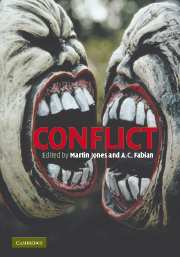Book contents
- Frontmatter
- Contents
- List of figures
- Acknowledgements
- Introduction: Arenas of conflict
- 1 Intrapersonal conflict
- 2 Sex differences in mind
- 3 Why apes and humans kill
- 4 The roots of warfare
- 5 Conflict in the Middle East
- 6 Observing conflict
- 7 Conflict and labour
- 8 Life in a violent universe
- Notes on the contributors
- Index
1 - Intrapersonal conflict
Published online by Cambridge University Press: 11 August 2009
- Frontmatter
- Contents
- List of figures
- Acknowledgements
- Introduction: Arenas of conflict
- 1 Intrapersonal conflict
- 2 Sex differences in mind
- 3 Why apes and humans kill
- 4 The roots of warfare
- 5 Conflict in the Middle East
- 6 Observing conflict
- 7 Conflict and labour
- 8 Life in a violent universe
- Notes on the contributors
- Index
Summary
In his Principles of Psychology, William James discussed five types of decisions. Most decisions he noted are decisions without effort, but in the
final type of decision, the feeling that the evidence is all in, and that reason has balanced the books, may be either present or absent. But in either case we feel, in deciding, as if we ourselves by our own willful act inclined the beam: … If examined closely, its chief difference from the former cases appears to be that in those cases the mind at the moment of deciding on the triumphant alternative dropped the other one wholly or nearly out of sight, whereas here both alternatives are steadily held in view, and in the very act of murdering the vanquished possibility the chooser realizes how much in that instant he is making himself lose. It is deliberately driving a thorn into one's flesh; and the sense of inward effort with which the act is accompanied is an element which sets the fifth type of decision in strong contrast with the previous four varieties, and makes of it an altogether peculiar sort of mental phenomenon.
(p. 1141)After consideration of the kinds of decisions that are made with, and without, effort, James concluded that ‘effort complicates volition … whenever a rarer and more ideal impulse is called upon to neutralize others of a more instinctive and habitual kind’ (p. 1154).
- Type
- Chapter
- Information
- Conflict , pp. 8 - 22Publisher: Cambridge University PressPrint publication year: 2006
- 8
- Cited by

